|
|
|
Sort Order |
|
|
|
Items / Page
|
|
|
|
|
|
|
| Srl | Item |
| 1 |
ID:
131509
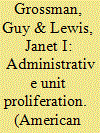

|
|
|
|
|
| Publication |
2014.
|
| Summary/Abstract |
Numerous developing countries have substantially increased their number of subnational administrative units in recent years. The literature on this phenomenon is, nonetheless, small and suffers from several theoretical and methodological shortcomings: in particular, a unit of analysis problem that causes past studies to mistakenly de-emphasize the importance of local actors. We posit that administrative unit proliferation occurs where and when there is a confluence of interests between the national executive and local citizens and elites from areas that are politically, economically, and ethnically marginalized. We argue further that although the proliferation of administrative units often accompanies or follows far-reaching decentralization reforms, it likely results in a recentralization of power; the proliferation of new local governments fragments existing units into smaller ones with lower relative intergovernmental bargaining power and administrative capacity. We find support for these arguments using original data from Uganda.
|
|
|
|
|
|
|
|
|
|
|
|
|
|
|
|
| 2 |
ID:
131510
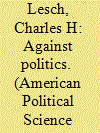

|
|
|
|
|
| Publication |
2014.
|
| Summary/Abstract |
Is politics compatible with the moral life? Recent attempts to revivify democracy have stressed the lived experience of political activity, the democratic character of the spontaneous moment and the popular movement. This article raises some concerns about such agonistic enthusiasm via an original reading of Walter Benjamin's political thought. For Benjamin, politics corrodes our everyday lives and moral conduct. His response is to envision a space for ethics wholly apart from the violence (Gewalt) that sustains propertied political order, a purified version of the Kantian kingdom of ends that he calls the "state of justice." Yet deprived of the coercive instrumentality of politics, there is no action that could lead humanity directly to such a state. To surmount this paradox, Benjamin culls from sources in Jewish political theology, and in particular, Jewish ideas about justice and the community of the righteous. In so doing, he offers a new and radical ethical critique of politics that may hold special relevance in our politics-saturated age.
|
|
|
|
|
|
|
|
|
|
|
|
|
|
|
|
| 3 |
ID:
131493
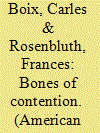

|
|
|
|
|
| Publication |
2014.
|
| Summary/Abstract |
Human osteological data provide a rich, still-to-be-mined source of information about the distribution of nutrition and, by extension, the distribution of political power and economic wealth in societies of long ago. On the basis of data we have collected and analyzed on societies ranging from foraging communities to the ancient Egyptian and modern European monarchies, we find that the shift from hunting and gathering to complex fishing techniques and to labor-intensive agriculture opened up inequalities that had discernible effects on human health and stature. But we also find that political institutions intervened decisively in the distribution of resources within societies. Political institutions appear to be shaped not only by economic factors but also by military technology and vulnerability to invasion.
|
|
|
|
|
|
|
|
|
|
|
|
|
|
|
|
| 4 |
ID:
131508


|
|
|
|
|
| Publication |
2014.
|
| Summary/Abstract |
This article compares the political theories that Mohandas Gandhi and Aurobindo Ghose develop around the assumption that harm or violence is an unavoidable feature of all human action. Both Ghose and Gandhi venerated the Bhagavadgita and shared a concern to foster life, and they shaped Hindu political theory by combining modern biological concepts with spiritual perspectives to determine the impact of harmful human actions within a totality of interdependent living beings. Although each thinker develops his anticolonial theory by balancing the value of life, the acceptance of an economy of violence, and the duty to act rather than renounce action, they diverge on the acceptability of violence whether in politics or in interactions with nature. Analyzing their framing of human actions as simultaneously biological and spiritual opens up a new perspective on Gandhi's refusal and Ghose's willingness to resort to violence in resistance to British colonial rule in India.
|
|
|
|
|
|
|
|
|
|
|
|
|
|
|
|
| 5 |
ID:
131500
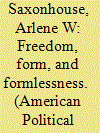

|
|
|
|
|
| Publication |
2014.
|
| Summary/Abstract |
Liberalism begins with the free individual; the liberal state comes into being in order to preserve that freedom. Part of that freedom, to use the language of John Stuart Mill, is choosing one's own life plan, escaping the forms and lifestyles imposed on us by history or nature. Two texts from ancient Athens-Euripides' Bacchae and Plato's Republic-explore the challenge posed by what I call "the escape from form." The Bacchae, while capturing our longing for a freedom from form, portrays the devastation of a city invaded by just that freedom; the Republic, while capturing the epistemological and political need for form, portrays a frightening vision of a city so bound by form that it becomes immobile. Socrates' self-critique in his reconsideration of the artisan in Republic 10, however, unites the forms his Callipolis demands with the multiplicity of human identities that the god Dionysus brings to Thebes in Euripides' tragedy.
|
|
|
|
|
|
|
|
|
|
|
|
|
|
|
|
| 6 |
ID:
131502


|
|
|
|
|
| Publication |
2014.
|
| Summary/Abstract |
Dispute resolution institutions facilitate agreements and preserve the peace whenever property rights are imperfect. In weak states, strengthening formal institutions can take decades, and so state and aid interventions also try to shape informal practices and norms governing disputes. Their goal is to improve bargaining and commitment, thus limiting disputes and violence. Mass education campaigns that promote alternative dispute resolution (ADR) are common examples of these interventions. We studied the short-term impacts of one such campaign in Liberia, where property disputes are endemic. Residents of 86 of 246 towns randomly received training in ADR practices and norms; this training reached 15% of adults. One year later, treated towns had higher resolution of land disputes and lower violence. Impacts spilled over to untrained residents. We also saw unintended consequences: more extrajudicial punishment and (weakly) more nonviolent disagreements. Results imply that mass education can change high-stakes behaviors, and improving informal bargaining and enforcement behavior can promote order in weak states.
|
|
|
|
|
|
|
|
|
|
|
|
|
|
|
|
| 7 |
ID:
131505
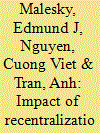

|
|
|
|
|
| Publication |
2014.
|
| Summary/Abstract |
Comparative political economy offers a wealth of hypotheses connecting decentralization to improved public service delivery. In recent years, influential formal and experimental work has begun to question the underlying theory and empirical analyses of previous findings. At the same time, many countries have grown dissatisfied with the results of their decentralization efforts and have begun to reverse them. Vietnam is particularly intriguing because of the unique way in which it designed its recentralization, piloting a removal of elected people's councils in 99 districts across the country and stratifying the selection by region, type of province, and urban versus rural setting. We take advantage of the opportunity provided by this quasi experiment to test the core hypotheses regarding the decision to shift administrative and fiscal authority to local governments. We find that recentralization significantly improved public service delivery in areas important to central policy-makers, especially in transportation, healthcare, and communications.
|
|
|
|
|
|
|
|
|
|
|
|
|
|
|
|
| 8 |
ID:
131494


|
|
|
|
|
| Publication |
2014.
|
| Summary/Abstract |
Most U.S. state supreme court justices face elections or reappointment by elected officials, and research suggests that judicial campaigns have come to resemble those for other offices. We develop predictions on how selection systems should affect judicial decisions and test these predictions on an extensive dataset of death penalty decisions by state courts of last resort. Specifically, the data include over 12,000 decisions on over 2000 capital punishment cases decided between 1980 and 2006 in systems with partisan, nonpartisan, or retention elections or with reappointment. As predicted, the findings suggest that judges face the greatest pressure to uphold capital sentences in systems with nonpartisan ballots. Also as predicted, judges respond similarly to public opinion in systems with partisan elections or reappointment. Finally, the results indicate that the plebiscitary influences on judicial behavior emerge only after interest groups began achieving success at targeting justices for their decisions.
|
|
|
|
|
|
|
|
|
|
|
|
|
|
|
|
| 9 |
ID:
131506
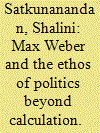

|
|
|
|
|
| Publication |
2014.
|
| Summary/Abstract |
According to the prevailing interpretation of "Politics as a Vocation," the Weberian political leader is willing to leave morality behind and make hard-headed consequentialist calculations about political means. I argue that the Weberian political leader is more accurately described as someone who keeps calculation in its place-both in terms of assessing the consequences of pursuing certain means and, more fundamentally, in terms of a basic framework for viewing responsibility and the world. Indeed, inappropriate substitutions of "calculative" thinking for a broader, more responsive thoughtfulness about the world mark Weber's three paradigms of irresponsible political leadership: the morally absolutist politician, the bureaucratic politician, and the power politician. Further, foregrounding Weber's effort to corral calculation reveals that uncompromising ethical stands in politics need not amount to naïveté or reckless disregard for the consequences, and that morality has a continuing claim on his ideal leader.
|
|
|
|
|
|
|
|
|
|
|
|
|
|
|
|
| 10 |
ID:
131504
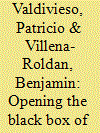

|
|
|
|
|
| Publication |
2014.
|
| Summary/Abstract |
This paper introduces a rational choice model for multiple kinds of participation to empirically investigate several theoretical determinants of social capital (SC) formation. The framework is rich enough to investigate the importance of individual variables, social/peer effects, endogenous trust, political-institutional, and inequality factors as sources of participation. We show that the aforementioned contextual factors explain SC formation for Chile, but their relative importance varies for each kind of participation. Our second application compares individual-level determinants of SC formation among the largest democracies in the Americas. Gender, age, education, and race show heterogeneous effects across countries. Overall, negative interpersonal trust shocks generate participation increments, and possibly motivate engagement in trustworthy networks. Idiosyncratic factors behind participation and trust are positively correlated, suggesting a common SC stem that manifests in multiple ways. Hence, our empirical approach to SC formation uncovers factors hidden by assumptions in some previous literature.
|
|
|
|
|
|
|
|
|
|
|
|
|
|
|
|
| 11 |
ID:
131499


|
|
|
|
|
| Publication |
2014.
|
| Summary/Abstract |
This article analyzes a rich Swedish data set with information on the electoral turnout of a large sample of adoptees, their siblings, their adoptive parents, and their biological parents. We use a simple regression framework to decompose the parent-child resemblance in voting into pre-birth factors, measured by biological parents' voting, and post-birth factors, measured by adoptive parents' voting. Adoptees are more likely to vote if their biological parents were voters and if they were assigned to families in which the adoptive parents vote. We find evidence of interactions between the pre- and post-birth factors: the effect of the post-birth environment on turnout is greater amongst adoptees whose biological mothers are nonvoters. We also show that the relationships between parental characteristics, such as education, and child turnout, persist even in the absence of a genetic link between parent and child. The regression-based framework we utilize provides a basis for the integration of behavior-genetic research into mainstream political science.
|
|
|
|
|
|
|
|
|
|
|
|
|
|
|
|
| 12 |
ID:
131497


|
|
|
|
|
| Publication |
2014.
|
| Summary/Abstract |
This paper argues that the benefits of international institutions accrue disproportionately to pairs of states that find cooperation most difficult. It determines which states achieve the greatest gains from these institutions by identifying a central reason that states fail to cooperate in international relations: they fear being "held up" by other states for political concessions. Political hold-up problems occur when one state fails to undertake an otherwise productive investment due to the increased ability it would give another state to extract political concessions. Focusing on the World Trade Organization (WTO), I demonstrate that political hold-up problems are pervasive in international relations due to links between economic and political policies, but that international institutions can solve hold-up problems by helping to enforce agreements. I first formalize this argument and then empirically test the implications derived from the model, finding that the WTO increases trade most for politically dissimilar states by reducing states' abilities to hold up their trading partners for foreign policy concessions. I provide evidence of the causal mechanism by showing that WTO membership increases trade in contract-intensive goods and boosts fixed capital investment. I conclude that by solving political hold-up problems, international institutions can normalize relations between politically asymmetric states that differ in terms of capabilities, regime types, and alliances.
|
|
|
|
|
|
|
|
|
|
|
|
|
|
|
|
| 13 |
ID:
131495
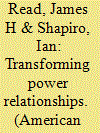

|
|
|
|
|
| Publication |
2014.
|
| Summary/Abstract |
Chronic communal conflicts often embody prisoner's dilemmas. Both communities prefer peace to war. Yet neither trusts the other, viewing the other's gain as its loss, so potentially shared interests often go unrealized. Achieving positive-sum outcomes from apparently zero-sum struggles requires a particular kind of risk-embracing leadership. To succeed leaders must (a) see power relations as potentially positive-sum, (b) strengthen negotiating adversaries when tempted to weaken them, and (c) demonstrate hope for a positive future and take great personal risks to achieve it. Such leadership is exemplified by Nelson Mandela and F. W. de Klerk in the South African democratic transition. To illuminate the strategic dilemmas Mandela and de Klerk faced, we examine the work of Robert Axelrod, Thomas Schelling, and Josep Colomer, who highlight important dimensions of the problem but underplay the role of risk-embracing leadership. Finally we discuss leadership successes and failures in the Northern Ireland settlement and the Israeli-Palestinian conflict.
|
|
|
|
|
|
|
|
|
|
|
|
|
|
|
|
|
|
|
|
|